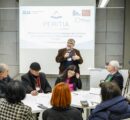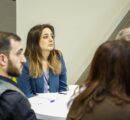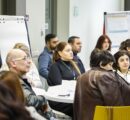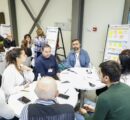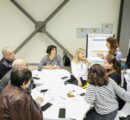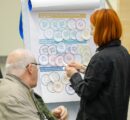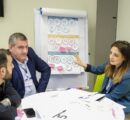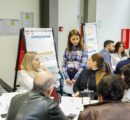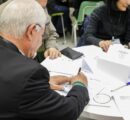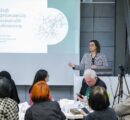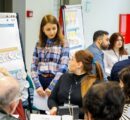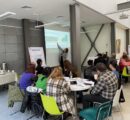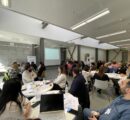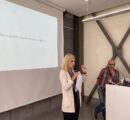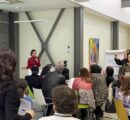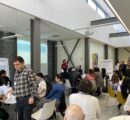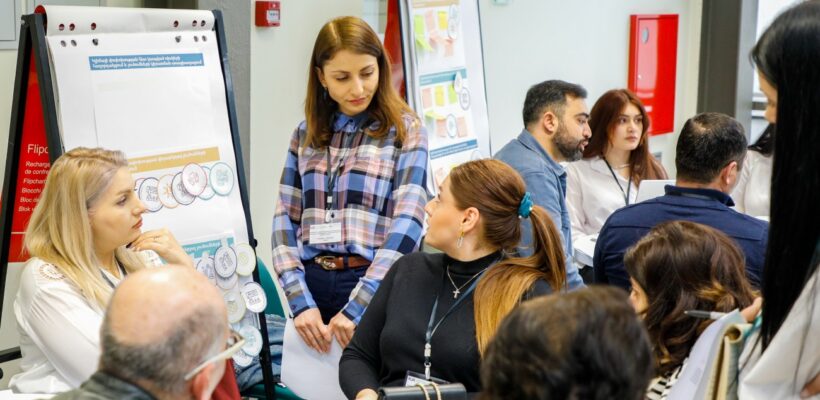
Yerevan Residents Deliberate on City’s Transport Policy and the Climate
3 min readYerevan, Armenia — On March 11 , 35 Yerevan residents assembled at the American University of Armenia (AUA) for a Deliberative Mini Public (DMP), a forum to hear from experts, reflect, and deliberate on urban transportation policy choices for Yerevan, especially in the context of climate change.
The Yerevan DMP was the last one in the series of similar events held in London, Berlin, Dublin, and Warsaw over the past three months. It is also among the final activities of the 3.5-year EU Horizon 2020 project PERITIA focused on trust in expertise and policymaking. The Yerevan DMP was organized by PERITIA partners, the AUA Acopian Center for the Environment, University College Dublin, Sense about Science, and The Policy Institute at King’s College London.
Co-chaired by PERITIA team members, the AUA Acopian Center public-participation specialist Sonya Msryan and director Alen Amirkhanian, the Yerevan DMP featured talks by climate change and urban transportation specialists, including a scientific expert, a journalist, and a civil-society representative.
Astghine Pasoyan, AUA faculty member and head of the Energy Savings Foundation, spoke about climate change and the role of the transportation sector on carbon emissions, highlighting concepts and directions for sustainable mobility that would mitigate the sector’s negative impacts. Urbanista journalist Anahit Minasyan presented several cases of sustainable mobility solutions from around the world that address transportation challenges similar to those Yerevan faces. Hayk Zalibekyan, an architect and a civil society representative, discussed transportation infrastructure solutions viable for Yerevan, introducing the benefits and drawbacks of each option.
Following the expert presentations, participants had the chance to further explore the topics presented in five smaller groups, each with a trained facilitator and a note taker. All participants in the groups were encouraged to express their thoughts and concerns. The groups also had the opportunity to ask questions and discuss their thoughts with the three experts, who stopped by each group. The participants eventually proposed policy directions they believed would best improve Yerevan’s transportation system and mitigate the environmental impact of fuel emissions.
“A DMP or a Citizen Forum is a tool used to deepen skills and increase trust in democratic decision making,” explained Msryan. “To the best of our knowledge, this is the first time such a process has been undertaken in Armenia. We are moved by how deeply the participants appreciated the opportunity to understand and weigh into questions of both local and global significance. They felt included and empowered,” she added.
A DMP, alternatively called a Citizen Forum or a Citizen Assembly, allows participants to engage directly in policy decision making. Such deliberative decision-making methods have become increasingly popular worldwide. They differ from town hall meetings or other forms of public gatherings in that they follow a rigorous methodology ensuring participants are randomly selected from all walks of life, fairly representing their society. The method of engagement is highly structured to ensure adequate voice is given to all participants in a respectful setting. For more information on Citizen Assemblies, listen to an informative talk by Professor Jane Suiter organized in the context of another AUA Acopian Center event.
Researchers organizing the DMP will assess the effect of such deliberations and meetings with experts to determine if and how they improve trust in experts and policymakers working within the sphere of climate change and public transportation. The findings from the Yerevan DMP will also be conveyed to the Yerevan Municipality.
The AUA Acopian Center for the Environment, a research center of the American University of Armenia, promotes the protection and restoration of the natural environment through research, education, and community outreach. The AUA Acopian Center’s focus areas include sustainable natural resource management, biodiversity and conservation, greening the built environment, clean energy, and energy efficiency, as well as information technology and the environment.


